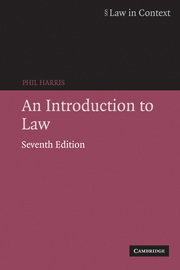Book contents
- Frontmatter
- Contents
- Preface
- Table of statutes
- Table of cases
- 1 Law and society
- 2 Law and morality
- 3 Law and the regulation of economic activity
- 4 Some important legal concepts
- 5 Law and property
- 6 Law and the settlement of disputes
- 7 The making of legal rules
- 8 The European dimension of English law
- 9 Liability in English law: the law of tort
- 10 Liability in English law: crime and the criminal justice system
- 11 The development and the role of the contract
- 12 Law and government
- 13 The legal profession
- 14 The judges
- Index
7 - The making of legal rules
- Frontmatter
- Contents
- Preface
- Table of statutes
- Table of cases
- 1 Law and society
- 2 Law and morality
- 3 Law and the regulation of economic activity
- 4 Some important legal concepts
- 5 Law and property
- 6 Law and the settlement of disputes
- 7 The making of legal rules
- 8 The European dimension of English law
- 9 Liability in English law: the law of tort
- 10 Liability in English law: crime and the criminal justice system
- 11 The development and the role of the contract
- 12 Law and government
- 13 The legal profession
- 14 The judges
- Index
Summary
One of the most important functions of any legal system is the authoritative statement of the normative legal code – the legal rules – by which the society in question is to operate. As we have seen, legal rules are not necessarily the only normative codes which prescribe social behaviour (morals and etiquette are others), but legal rules are distinct in that they constitute the official code which has the backing of state powers of enforcement and sanctions. In this chapter we examine the principal sources in modern society whereby legal rules are created.
Parliamentary legislation: politics, pressures and public policy
According to the constitution, Parliament or, more correctly, the ‘Queen in Parliament’, is the sovereign law-maker in Britain. This means that although the judges have a role in the law-making process, they must bow to the superior powers of the legislature who may override judge-made ‘common law’ rules by Acts of Parliament. Britain's membership of the European Community has brought dramatic consequences for this constitutional doctrine, as we will see in chapter 8. In this chapter, however, we will concentrate on the domestic law-making processes of the UK, and in this first section we consider the procedural aspects of legislation and discuss the background to and impact of legislative enactments.
Information
- Type
- Chapter
- Information
- An Introduction to Law , pp. 190 - 214Publisher: Cambridge University PressPrint publication year: 2006
